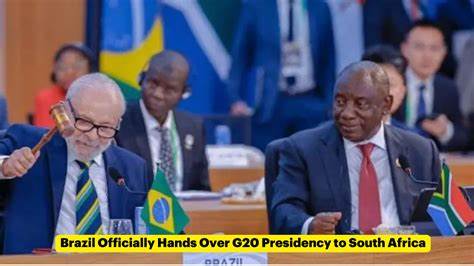
Edson Baraukwa | Africa Guardian
For the first time, Africa has taken a seat as a full member of the G20, marking a transformative step in the continent’s pursuit of global influence. The 2024 G20 Summit, held in Rio de Janeiro, Brazil, on November 18–19, provided a platform for African leaders to push for urgent reforms in global finance and climate justice.
A Historic Milestone
The African Union’s inclusion as a permanent member of the G20 in September 2023 represents a significant shift in global diplomacy. Africa’s voice is now not only heard but actively sought on critical issues such as debt sustainability, climate finance, and international taxation.
“This is a pivotal moment for Africa to solidify its role as a rule maker, not a rule taker,” said Jason Braganza, Executive Director of the African Forum and Network on Debt and Development (AFRODAD). He emphasized that full membership enhances Africa’s ability to advocate for meaningful reforms and global equity.
Tackling Africa’s Debt Crisis
Africa’s mounting debt burden was a key focus of the summit. Leaders called for urgent reforms in global lending practices, including concessional financing and fairer assessments of risk and valuation.
“The incoming South African presidency offers an opportunity to emphasize Africa’s debt crisis and push for a comprehensive reform package,” Braganza added.
Mavis Owusu-Gyamfi, President and CEO of the Africa Centre for Economic Transformation, outlined Africa’s financial priorities:
- Expanding access to concessional finance
- Resolving the debt crisis
- Combating illicit financial flows
- Establishing a fair international tax framework
Climate Justice and Energy Transition
Climate change featured prominently in Africa’s agenda. Leaders called for equitable energy transitions and affordable climate finance to address the continent’s vulnerability to climate impacts.
“With South Africa putting inequality at the center of its G20 presidency, there’s an opportunity to discuss options to reduce the cost of capital for climate transitions and ensure fairness for all,” said Faten Aggad, Executive Director of the African Future Policies Hub.
Ken Opalo, Assistant Professor at Georgetown University, cautioned against carbon tax regimes that could undermine Africa’s export competitiveness. “Africa must resist harmful carbon tax policies while advocating for trade frameworks that prioritize development,” he said.
Looking Ahead: South Africa’s Historic G20 Presidency
The summit also set the stage for South Africa’s 2025 G20 presidency, the first to be hosted on African soil. Under the theme “Fostering Solidarity, Equality, and Sustainable Development,” South Africa aims to address the continent’s triple challenges of poverty, unemployment, and inequality.
Aligned with the African Union’s Agenda 2063, the presidency presents a unique opportunity for Africa to lead discussions on sustainable development and economic reforms.
A Unified Approach for Global Advocacy
As Africa enters this transformative era, leaders are calling for a unified voice to amplify the continent’s priorities on the global stage.
“Africa must coordinate its demands to reform the global sovereign lending market and secure substantial climate finance,” Opalo emphasized.
With a strengthened presence in global decision-making, Africa is poised to champion reforms that promote fairness, sustainability, and prosperity for the continent and beyond.
___
